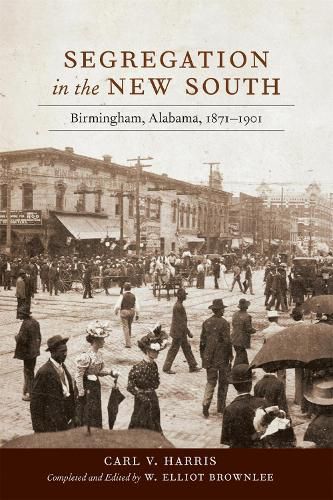Readings Newsletter
Become a Readings Member to make your shopping experience even easier.
Sign in or sign up for free!
You’re not far away from qualifying for FREE standard shipping within Australia
You’ve qualified for FREE standard shipping within Australia
The cart is loading…






Carl V. Harris’s Segregation in the New South, completed and edited by W. Elliot Brownlee, explores the rise of racial exclusion in late nineteenth-century Birmingham, Alabama. In the 1870s, African Americans in this crucial southern industrial city were eager to exploit the disarray of slavery’s old racial lines, assert their new autonomy, and advance toward full equality. However, most southern whites worked to restore the restrictive racial lines of the antebellum South or invent new ones that would guarantee the subordination of Black residents. From Birmingham’s founding in 1871, color lines divided the city, and as its people strove to erase the lines or fortify them, they shaped their futures in fateful ways.
Social segregation is at the center of Harris’s history. He shows that from the beginning of Reconstruction southern whites engaged in a comprehensive program of assigning social dishonor to African Americans-the same kind of dishonor that whites of the Old South had imposed on Black people while enslaving them. In the process, southern whites engaged in constructing the meaning of race in the New South.
$9.00 standard shipping within Australia
FREE standard shipping within Australia for orders over $100.00
Express & International shipping calculated at checkout
Carl V. Harris’s Segregation in the New South, completed and edited by W. Elliot Brownlee, explores the rise of racial exclusion in late nineteenth-century Birmingham, Alabama. In the 1870s, African Americans in this crucial southern industrial city were eager to exploit the disarray of slavery’s old racial lines, assert their new autonomy, and advance toward full equality. However, most southern whites worked to restore the restrictive racial lines of the antebellum South or invent new ones that would guarantee the subordination of Black residents. From Birmingham’s founding in 1871, color lines divided the city, and as its people strove to erase the lines or fortify them, they shaped their futures in fateful ways.
Social segregation is at the center of Harris’s history. He shows that from the beginning of Reconstruction southern whites engaged in a comprehensive program of assigning social dishonor to African Americans-the same kind of dishonor that whites of the Old South had imposed on Black people while enslaving them. In the process, southern whites engaged in constructing the meaning of race in the New South.